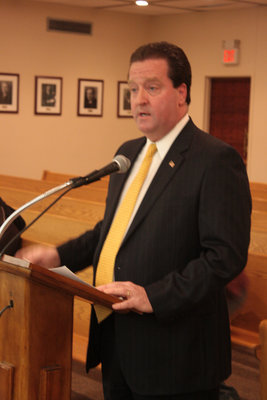Bayonne Mayor Mark Smith introduced the $130 million 2011 fiscal year budget on Monday, saying it will cause a 3.9 percent tax increase.
“While we continue to work on the budget, as proposed, it contains a modest increase of 3.9 percent,” Smith said.
While the total figures are not in for the full budget that includes a number of state and other grants, the introduced budget is about $5 million less than last year, a figure that Chief Financial Officer Terrence Malloy said will change over the next few months.
What is critical is the amount that needs to be raised by taxes, which rises from $66.8 million last year to $69.4 million in the new budget.
“This is a budget that does not rely on borrowing.” – Mayor Mark Smith
________
Residents pay an overall tax rate that comes from three budgets – the Bayonne town budget, the county budget (usually approved in June), and the school budget (usually approved in April). The new budget affects only the town portion, so the other two tax rates can make overall property taxes higher or lower. Because of those other budgets, taxpayers will see only a 1.9 percent increase in total taxes for the first two quarters of the upcoming year, Malloy said.
Good news and bad news
“This is a budget that does not rely on borrowing,” Smith said. “I vowed when I took office in late 2008 that I would not borrow to balance the budget, and I have kept that promise.”
As far as trying to cut costs, the mayor said the municipal employee count is the lowest since the 1990s and that the city is trying to become more efficient. One of the keys to reducing costs for today and the future is to cut the yearly budget shortfall, which has been at times as high as $30 million.
Smith said the city has cut $2 million in annual spending through a variety of measures that include cheaper prescription and health benefit plans for city workers and a wage freeze for police, fire, and municipal workers for 18, 19 and 24 months.
But costs are still rising, such as pension obligations and fuel, heath and energy costs.
The good news is that the city has increased the ratable base, bringing on several large projects such as the new Bayonne Crossing Mall and the energy center.
Another success story, he said, is the ability of the city to retire debt over the last two years. Ten million in debt was retired last year, and $9.8 million was retired this year.
“That’s a debt our children will not have to pay,” he said, noting that the City Council will no doubt look over the budget carefully to consider additional cuts, and that Malloy will hold a public meeting in the near future so that residents of the city can offer their own suggestions.
